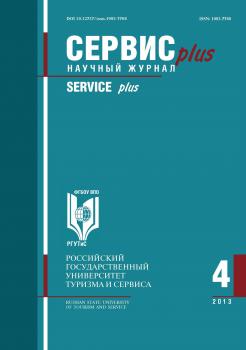Moscow, Russian Federation
Moscow, Russian Federation
This article deals with the creation and development of the tourist destinations. The authors describe different types of development-related destination appeal, propose a logically interconnected sequence of stages in the formation of the desired profile of a tourist destination, and show that, in order to ensure effective functioning, it is imperative that economic and mathematical modeling to assess the potential of the current and achievable competitiveness of tourist destinations be used. The proposed model allows to calculate the quantitative effect of attracting investment to the development of tourist destinations. The defining characteristics are the coefficient of efficiency of economic activity of a tourist destination, and the efficiency ratio of a tourist destination. The authors introduce a new measure — the coefficient of tourist loyalty to a destination (coefficient of return tourist business) and propose a formula for calculating the integral index of the efficiency (competitiveness) of a tourist destination. In the article, the authors consider the basic principles of forecasting, which are to be taken into account in the course of the development-forecast model construction; provide a description of forecast models, and identify the properties required of an efficient forecasting model.
tourism, forecasting in tourism, tourist destination
В любой стране развитие туризма всегда сопряжено с большими финансовыми затратами, которые необходимы для формирования инфраструктуры туризма, реализации маркетинговых и рекламных программ для привлечения потенциальных туристов. В Федеральной целевой программе «Развитие внутреннего и въездного туризма в Российской Федерации (2011–2018 гг.)» также предполагаются большие объемы финансирования, при этом более 30% должно обеспечиваться за счет средств привлекаемых инвесторов. В настоящее время в России реализуется 49 различных Федеральных целевых программ (ФЦП). Анализ выполнения этих ФЦП, проведенный в сентябре 2013 г. и рассмотренный на заседании Правительства Российской Федерации, показал, что программа развития туризма является одной из пяти медленно реализуемых программ. Одной из серьезных проблем является низкий уровень софинансирования из средств субъектов федерации и внебюджетных источников. Для улучшения качества реализации ФЦП предлагается усилить зависимость финансирования программ от достижения их целевых индикаторов.
1. Leont´ev V.V. Mezhotraslevaya ekonomika. M.: Ekonomika, 1997.
2. Mezhdunarodnye rekomendatsii po statistike turizma YuNVTO (MRST2008). Statisticheskie dokumenty. Seriya M № 83, Madrid, N´yu-York, 2008.
3. Morozova N.S., Morozov M.A. Predprinimatel´stvo i konkurentsiya v turizme. Monografiya. M.: RosNOU, 2010.
4. Morozova N.S. Kontseptsiya formirovaniya i razvitiya konkurentsii v turizme. Monografiya. M.: RosNOU, 2011.
5. Hara Tadayuki. Quantitative Tourism Industry Analysis Introduction to Input-Output, Social Accounting Matrix Modeling, and Tourism Satellite Accounts., 2008.

















